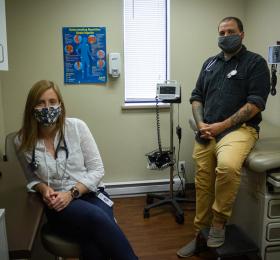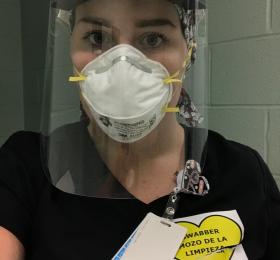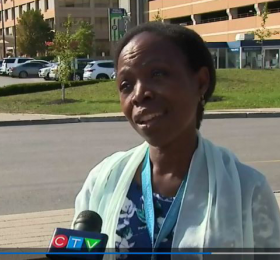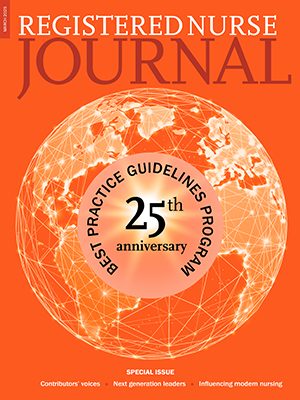RN recognized for dedication to organ donation
Retired Brant Community Healthcare System (BCHS) nurse manager and RNAO member Barbara Longo received a Hospital Donation Champion Award from the Trillium Gift of Life Network. The award is given to health-care professionals who are exceptional advocates for organ and tissue donation. Longo’s passion for organ donation and transplantation comes from her own family’s experience. Her mother-in-law is a kidney donor recipient and Longo became a living kidney donor for her husband. She says that being an RN helped her start conversations about organ donation that people may not otherwise have with their families. Longo says that organ donation is a true team effort. “Everyone understands what to do and believes in the importance of the donation and transplant program. It’s embedded in their practice,” she says of colleagues at BCHS. “I am fortunate to have worked in a profession and with an organization that can make a difference every day in the lives of patients and their families, and for the patients and families we will never meet.”
RNAO members, CEO named fellows of Canadian Academy of Nursing
Eighteen RNAO members, including CEO Doris Grinspun, were inducted as fellows of the Canadian Academy of Nursing (CAN) on Nov. 20. They include: Grinspun; RNAO past-president Judith Shamian; former IABPG director and past-president Irmajean Bajnok; Provincial Chief Nursing Officer Michelle Acorn; and individual members Helene Berman, Lorie Donelle, Maher El-Masri, Marilyn Ford-Gilboe, Pam Hubley, Lianne Jeffs, Kimberley LeBlanc, Dianne Martin, Earl Nowgesic, Beverly Simpson, Victoria Smye, Dawn Stacey, Bonnie Stevens and Carol Young-Ritchie. This esteemed group has worked in important leadership roles and across many domains and sectors of the health system.
The academy, which was developed by the Canadian Nurses Association, is the first organization in Canada dedicated to identifying, educating, supporting and celebrating nursing leaders across the country. These new inductees were chosen based on their substantial contributions and sustained impact on the nursing profession.
“Congratulations to all of our accomplished RNAO members who will be part of the first fellowship class,” says RNAO President Morgan Hoffarth. Grinspun adds: “I am inspired by all inductees and their contributions, and especially proud of my fellow RNAO members who are receiving this important recognition. They are amazing nursing leaders and their outstanding work and dedication to advancing the nursing profession and its impact on people’s health is being honoured. It is fitting that during the Year of the Nurse their incredible contributions are being celebrated in this way.”
Find out more about CAN and read the biographies of the inductees.
Niagara community health centre provides HIV prevention
Quest Community Health Centre is providing residents of the Niagara region with access to pre-exposure prophylaxis (PrEP), a combination of two antiretroviral drugs that can prevent HIV after an exposure. Emily Kedwell, a nurse practitioner and lead of an interdisciplinary medical and allied health team at Quest, says: “It’s quite difficult to access PrEP in Niagara; it’s quite difficult to access HIV treatment in Niagara.” RN Steven Athanasas, who is involved in the organization’s bid to become an RNAO Best Practice Spotlight Organization, is a member of the LGBTQ+ community and says: “There’s no judgment whatsoever; you could be super promiscuous, you could be sleeping with two people, you could have a steady partner who may be HIV-positive — it doesn’t matter to me. I’m here to help (patients) out, I’m here to listen and do what’s right for them...I hope we play some small part in preventing HIV for the community.” (Niagara This Week, Sept. 17)
COVID-19 Courage Award for RNAO CEO
On Oct. 29, RNAO CEO Doris Grinspun received the American Academy of Nursing’s (AAN) prestigious COVID-19 Courage Award for her work and contributions in the area of policy. She was among four nurses selected to receive an award, with the other three receiving recognition for developments in innovation, leadership and science.
“Courage is the capacity to speak out when one must to move change...and to not only say it once, but persist in saying it until change is achieved,” Grinspun said about influencing policy. “A huge battle that we won from a policy perspective – and feel tremendously proud about at RNAO – is that we succeeded to convince the premier of this province to reopen nursing homes for families. Essential caregivers are now allowed to go and be with their loved ones to support them during this difficult time.”
An effective policy expert and 2018 AAN fellow, Grinspun skillfully uses evidence to influence policy decisions at the provincial, national and international levels. She is in regular contact with the premier of Ontario, health minister and other top officials in charge of the government’s COVID-19 response plan. She is well-known among the media as an outspoken and evidence-grounded advocate for policy change that will help vulnerable populations, including residents in long-term care homes, as well as people experiencing homelessness. She is a tireless champion and is especially concerned about these groups during the pandemic.
When asked the source of her courage, Grinspun said: “Whether it is with my family, my community or with nursing, health or health care - at the core of it - my courage is driven by a deep desire to leave behind a better world than the one that we came to.” And to the question about what moved her to focus her advocacy work on policy, Grinspun noted: “We have outstanding clinicians, educators, administrator and researchers in nursing. What we need are outstanding policy makers who can master not only the evidence and the values to drive policy...but the courage to speak out.”
Read about all of the winners HERE. For more on RNAO’s COVID-19 advocacy efforts, visit the COVID-19 portal with links to Grinspun’s weekly COVID-19 blog.
Ontario needs to take action and save lives in long-term care
RNAO CEO Doris Grinspun spoke with CBC radio’s Metro Morning about early recommendations released Oct. 23 by the independent commission looking into the spread of COVID-19 in long-term care homes. The commission is expected to issue its report in April of next year, but released its preliminary recommendations on staffing and infection prevention and control in light of the spike in cases during the second wave of the pandemic. The commission would like to see a minimum of four hours of daily direct care for each resident, as well as increasing the supply of personal support workers and nurses. When asked what the recommendation for four hours of direct care would mean to residents, Grinspun notes it will provide residents with the quality care they deserve. “That care should be 48 minutes from an RN, 60 minutes from an RPN, and 132 minutes from a PSW, every day for each resident,” she says, noting this required mix of staff is outlined in the association’s Nursing Home Basic Care Guarantee submission to government (released in June 2020). (Oct. 26)
RNAO member honoured with VON Canada Award of Distinction
Bracebridge RN Nan Cleator received a national Victorian Order of Nurses (VON) Award of Distinction at a virtual awards ceremony on Sept. 25. Cleator, who has worked at VON for 30 years, is a national practice consultant and helps guide practices for those delivering home care. She has also served as a member of the Public Health Agency of Canada’s Expert Working Group since 2003. In that role, she brings the home and community care perspective to the agency’s national infection prevention and control guidelines. In addition to her main role, Cleator was also recognized for her contribution in helping to shape VON’s COVID-19 response. “It is an honour to be recognized for this award and I am especially humbled to be recognized by my colleagues and VON leaders,” says Cleator. (Bracebridge Examiner, Oct. 6)
Nursing student cares for migrant workers during COVID-19
Nursing student Kaitlyn McCarthy didn’t know what to expect when COVID-19 hit, but she did know that she needed to help. "Either I roll with it or it's going to roll over me," the co-chair of Windsor’s Hotel Dieu Grace Hospital Youth Advisory Committee says. “I ...decided that I’m going to move with it and that’s where my future will take me.” McCarthy began working as a summer student with the migrant worker COVID-19 assessment team at Erie Shores Healthcare, also in Windsor. She says the experience, checking in migrant workers for assessment, was one of the best things to ever happen to her. "I've been able to learn more about my community and I've been able to learn how, in the future...when I become a registered nurse...I'll be able to help my patients," she says. "It's humbling and it's exciting and it's a new way to learn for me." Despite a language barrier, McCarthy was able to provide support to a worker who was fearful about dying after one of his colleagues passed away from the virus. She says that being on the front-line of COIVD-19 isn’t easy. “You have to put your whole heart into this.” (CBC.ca, Aug. 22)
Nurses call on federal government to reinstate chief nursing officer
A letter from RNAO to Prime Minister Justin Trudeau was made public on Aug. 27, and was picked up by iPolitics and Canada’s National Observer. In the letter, RNAO formally asks the federal government to reinstate the role of national chief nursing officer, which was removed when Stephen Harper was prime minister. “Canada would be a healthier country if nurses and nursing had a role in our federal government,” says RNAO President Morgan Hoffarth, who co-penned the letter with CEO Dr. Doris Grinspun. Nurses play a vital role in our health-care system and they should also play a role in developing health policies, the letter notes. The letter also outlines other important health issues, including staffing issues that led to “preventable” deaths in long-term care during the first wave of the COVID-19 pandemic. Homelessness and the ongoing opioid crisis were also addressed. “Homelessness is the product of decades of public policy choices by all orders of government,” RNAO notes in the letter. “We implore you (Trudeau) to make different choices.” In the article published by iPolitics, Grinspun proposes that "the start of a new parliamentary session, combined with the World Health Organization designating 2020 the Year of the Nurse, presents a timely opportunity for an announcement." (Aug. 28 and 31)
Credit Valley staff members keep music alive in hospital
Amid the COVID-19 pandemic, many volunteer programs at Credit Valley Hospital in Mississauga had to be cancelled. One of these was the Music of Healing and Hope Program, which allows volunteer musicians to take turns playing for those gathered in the hospital’s lobby. Several front-line staff members decided to keep the music going by stepping up to the piano to volunteer their time during lunch breaks or even on their days off. Dian Ramnarine, an operating room RN, is one of the program’s volunteers. She says that people really missed the music. “It was so quiet. You noticed the difference with the absence of music. Now you have people commenting how wonderful it is to have the music back.” When the program was running with outside volunteers, there were 50 musicians who offered their time. Ramnarine is one of four staff members taking over during the pandemic, and says: “It’s been a genuine privilege and honour for me to do it...under the circumstances.” (CTV News, Sept. 29)
Historic B.C. Supreme Court decision safeguards universal health care
On Sept. 10, almost four years to the day a controversial court case – launched by physician Brian Day – started in the Supreme Court of British Columbia, a judge dismissed the constitutional challenge that Day and other supporters of for-profit health care argued violated the constitutional rights of patients. Day, founder of a private surgical facility in Vancouver said sections of the BC Medicare Protection Act prevented him from helping patients willing to pay for surgical procedures in the private system if wait times were longer in the public system. He wanted to strike down three provisions in the act: a ban on extra billing; the prohibition on selling private insurance for medically necessary care; and a prohibition on doctors working simultaneously in the public and private systems.
This case started in 2009, but didn’t get to the B.C. Supreme Court until 2016. RNAO issued a statement in 2016, noting it was “an attack on our country's health system, pure and simple. Brian Day believes…that the system exists for him and others to profit from it. Nurses are proud to work in a system that believes universal and equitable access to care is a human right. The path to improving our health system is not through compromising its core values, but instead through increasing universal access. Like all two-tier systems, Day's ideas benefit only a small elite, while substantially diminishing health outcomes for the rest of us.”
In his September ruling, Justice John Steeves rejected the argument that the rights of patients and physicians were violated by limits on access to privately paid surgical services, citing the act is focused on medically necessary services, not the ability to pay for such services.
RNAO applauds the historic September ruling (available in full HERE) for its support of universal health care as “part of our national identity,” CEO Doris Grinspun said.




